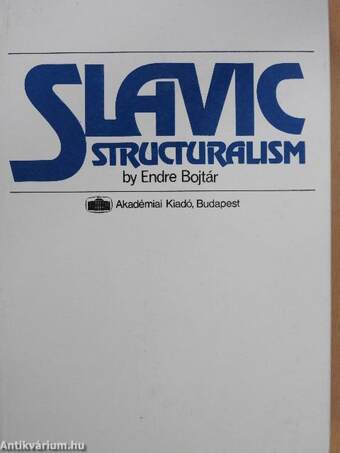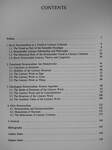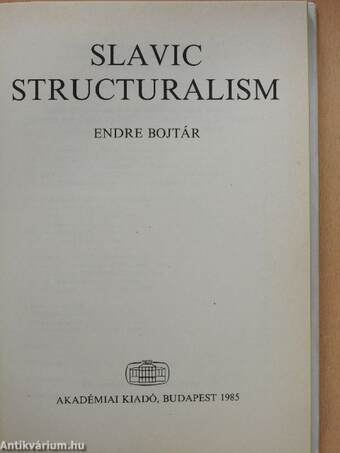1.067.308
kiadvánnyal nyújtjuk Magyarország legnagyobb antikvár könyv-kínálatát

VISSZA
A TETEJÉRE
JAVASLATOKÉszre-
vételek
Slavic Structuralism
| Kiadó: | Akadémiai Kiadó |
|---|---|
| Kiadás helye: | Budapest |
| Kiadás éve: | |
| Kötés típusa: | Fűzött keménykötés |
| Oldalszám: | 158 oldal |
| Sorozatcím: | |
| Kötetszám: | |
| Nyelv: | Angol |
| Méret: | 23 cm x 17 cm |
| ISBN: | 963-05-3949-7 |
| Megjegyzés: |
naponta értesítjük a beérkező friss
kiadványokról
naponta értesítjük a beérkező friss
kiadványokról
Előszó
TovábbFülszöveg
SLAVIC STRUCTURALISM
by Endre Bojtár
Endre Bojtár's book on Slavic Structuralism combines theory with the history of literary science. Special attention is paid to the work of Jan Mukarovsky and Roman Ingarden, to post-structuralist theories and to the approach of Marxist historicism.
Jan Mukarovsky wrote in his review on V. Sklovsky's book The Theory of Prose: "Let us start from Sklovsky's words: 'When studying literature I examine its internal laws. To use a comparison taken from industry, I am not interested in the world market price of wool, nor in trust policy—only in the types of yarn and in the ways of interweaving them.' The difference between modern structuralism and the above quoted formalist thesis could be expressed by pointing out that though the 'ways of interweaving' is still in the centre, yet the world market prices cannot be disregarded either, as the development of interweaving is regulated—even in a direct sense—not only by the development of weaving... Tovább
Fülszöveg
SLAVIC STRUCTURALISM
by Endre Bojtár
Endre Bojtár's book on Slavic Structuralism combines theory with the history of literary science. Special attention is paid to the work of Jan Mukarovsky and Roman Ingarden, to post-structuralist theories and to the approach of Marxist historicism.
Jan Mukarovsky wrote in his review on V. Sklovsky's book The Theory of Prose: "Let us start from Sklovsky's words: 'When studying literature I examine its internal laws. To use a comparison taken from industry, I am not interested in the world market price of wool, nor in trust policy—only in the types of yarn and in the ways of interweaving them.' The difference between modern structuralism and the above quoted formalist thesis could be expressed by pointing out that though the 'ways of interweaving' is still in the centre, yet the world market prices cannot be disregarded either, as the development of interweaving is regulated—even in a direct sense—not only by the development of weaving technology but also by demand and supply; mutatis mutandis, the same holds true regarding literature The error of traditional literary history was that it dealt only with the external interventions and denied literature its autonomous development, while formalism was also one-sided because it set the literary processes in a vacuum Structuralism, as the synthesis of the two above-mentioned opposites, maintains the thesis of autonomous development, yet it does not deprive literature of its external connections either, thus giving us an opportunity to grasp the development of literature in its totality as well as devoting ample attention to its inner laws."
AKADÉMIAI KIADÓ Budapest Vissza
Megvásárolható példányok
Nincs megvásárolható példány
A könyv összes megrendelhető példánya elfogyott. Ha kívánja, előjegyezheti a könyvet, és amint a könyv egy újabb példánya elérhető lesz, értesítjük.








